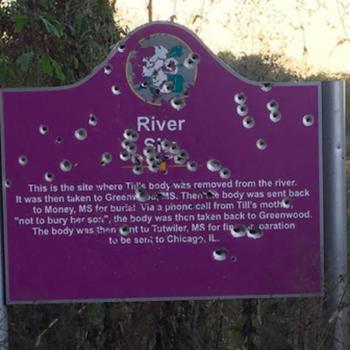I was raised in an evangelical home. I embraced my parents’ and church’s beliefs wholeheartedly. I was the sort of evangelical teen who hung out in the church library looking for new apologetics books to read. I was dedicated, and passionate, and wholehearted in my beliefs. As a young adult, these beliefs crumbled and fell through my fingers and I looked around, bewildered. How could I have been so very wrong, I wondered? That experience taught me something important—that I could be completely sure I was correct about something and yet be completely wrong.
Over the years, I’ve tried to grapple with this understanding—i.e., that I can be wrong about something I’m sure I’m right about—by working to actively embrace criticism. In other words, if someone says I’ve got something wrong, or that there’s something wrong about the way I’m presenting or talking about this issue or that, I try very hard to listen to their criticism, and with an interest in understanding it, before I mount any defense of my actions. In fact, I try to fight that defensive instinct altogether. I work very hard to be willing to be wrong.
There was a time when criticism triggered a flight or fight response in me, and it sometimes still does. I grew up in an authoritarian household and went through a very traumatic break with my parents while in college. In the years immediately following this, being criticized often triggered flashbacks of this trauma. While this has lessened over the years, embracing criticism often still takes active effort on my part.
With this background out there, I want to mention a trend I’ve noticed within social justice circles over the past few years. It goes like this: Person A says something (generally online) that Person B finds concerning. Person B patiently explains their concerns to Person A, either online or a private message. Person A responds by rejecting their criticism off the cuff, perhaps treating it as a personal attack or smear campaign. Persons C and D see what happens and respond with disappointment, hurt, and anger. Person A accuses Persons B, C, and D of carrying out a “witch hunt.”
I want to be very clear that I am not saying that every criticism is merited, or that being willing to be wrong means being always wrong. I’m also not saying that there aren’t actual witch hunts. (There are, though that’s a topic for another post.) What I am saying is that I have seen allegations of “witch hunts” used to shut down well-meant and thoughtful criticism without equally well-meant and thoughtful consideration. I’ve seen allegations of “witch hunts” used to discredit honest attempts at communication. And that’s a problem.
Last week I wrote an article summarizing the ongoing lawsuit against IBLP and Bill Gothard. In that article, I referred to the plaintiffs as “heroes” and “brave” for coming forward to file this lawsuit. Several days after posting this article, an individual contacted me to let me know that they were uncomfortable with this framing because they felt that, without context, it suggested implicitly that the various survivors not willing to go public and pursue a lawsuit were somehow not heroes or not brave.
I responded to this criticism by listening, and after rereading the paragraph in question with her words in mind I realized that I could have phrased that section better. I thanked her for pointing this out and edited the paragraph to add some consideration for the women not willing or able to go public at this time.
But I could have responded to her criticism by taking it as a personal attack and getting angry and telling her that I’d never meant any such thing when I wrote that paragraph (I hadn’t) and wasn’t going to change it thank you very much. And if I had responded in that way, I would have missed a valuable opportunity to learn something new and she would have been perfectly within her rights to tell others about how I had responded and to express concern that I wasn’t receptive to criticism or willing to listen.
Of course, it helped that the person who contacted me did so without assuming that I had meant to say anything negative. I have a much easier time embracing criticism when it is given positively than when it is given confrontationally—though I try very hard to embrace it just the same either way, and that’s an important point in and of itself. In my experience a gentler tone is less likely to trigger someone’s fight or flight response, and that means that, particularly when dealing with allies (who are more likely than others to listen), taking a less-confrontational tone is typically more effective. However, tone should never be an excuse for not listening, and no one owes it to anyone else to use a certain tone.
What I find really interesting about tone, though, is that I’ve seem people reject criticism based on tone when in fact the tone was fine. Or, I’ve seen cases where someone defends a person being defensive by claiming that they were “ganged up on” or “attacked” when in fact, if you go back and look, they weren’t. Usually, people use a friendly tone with good assumptions when initially making a criticism, and only take a more confrontational tone later, when they aren’t listened too—similarly, even when there are multiple people pointing out the same thing, they’re often each drawing from their individual experiences and adding helpful information rather than “ganging up.” So while I do try to use a gentler, less confrontational tone myself, I’m also very skeptical of those who say they would have listened if only the criticism had been made more “nicely” or if only people hadn’t “ganged up” on them.
Now mind you, I’m not saying everyone has to agree with every criticism someone else makes of their actions or words. I could have responded to the person who contacted me about my use of the words “heroes” and “brave” by letting her know that I’d read her concerns, and I’d thought about it, and I’d read back through the paragraph, and that while I understood her concerns I didn’t think what I’d written implied anything at all about the other women, and that I was therefore going to leave the wording as it was. Had I done so, she may still have disagreed with my phrasing, but she would at least have known that I had listened to her.
We need to not underestimate the importance of feeling (and being) listened to. I know I myself am much happier to disagree with someone if I know they at least tried to understand my perspective, and cared about what I had to say.
I would argue that we need to give allies a certain amount of grace—i.e., we shouldn’t immediately assume the worst of them or their words—but also that we need to hold allies to a greater level of responsibility—i.e., we should be able to expect allies to listen and to not reject criticism out of hand, especially when it’s a member of a minority or disadvantaged group making the critique. Similarly, we need to give allies room to learn from mistakes, but it is perfectly normal to feel wary while trust is being rebuilt, or to decide that you’ve been hurt enough times and need to sever bridges.
In the end, I’m not saying there are never witch hunts, or that no one ever gets on the wrong side of an online pile-up. What I am saying is that when faced with criticism, we all need to pause, breath, listen, and think before responding.















